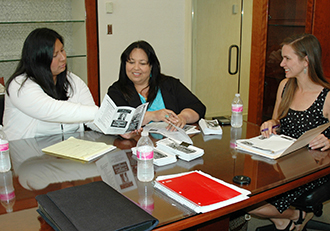Research with Native Americans breaks new ground
Catherine Burnette"s passion for helping Native Americans eliminate the violence and mental health disparities many experience, in comparison with non-Native Americans, is highlighted by years of research. Now, she has a chance to take that research to another level.

Nikki Comby, left, policy development officer for the Mississippi Band of Choctaw Indians, and Lora Ann Chaisson, center, vice principal chief of the United Houma Nation, review with Catherine Burnette her plans for research to bolster family resilience within the tribes. (Photo from the Tulane School of Social Work)
The United Houma Nation and the Mississippi Band of Choctaw Indians gave Burnette approval to collaborate on bolstering family resilience within the tribes. According to Burnette, an assistant professor in the Tulane University School of Social Work, this is the first time this culturally grounded research has been undertaken within tribes in the southeastern United States.
This new research builds upon years of work with tribal communities in the Southeast, and her dissertation at the University of Iowa focused on intimate partner violence within these tribal communities. That work has resulted in several publications along with several federal research proposals for the current research.
“We want to identify tribal members" visions of healthy and resilient families, culturally specific risk and protective factors related to family violence and mental health,” Burnette says. “This will allow us to develop a culturally relevant model of family resilience to prevent and treat family violence and bolster the well-being of community members.”
This research will include focus groups, individual and family interviews, participant observation and survey research. Burnette says the end result, which she expects in a few years, will be a culturally relevant model of family resilience. Burnette also has received a Global South Fellowship to support her research.
“This project is only possible because of the collaborative efforts and deep respect I have for Native Americans,” she says. “This project is important because it provides a culturally relevant model of family resilience which can inform and be adapted for tribal communities across the nation improving their quality of life and reducing violence and mental health disparities.”
Joseph Halm is marketing/communications coordinator for the Tulane School of Social Work.
